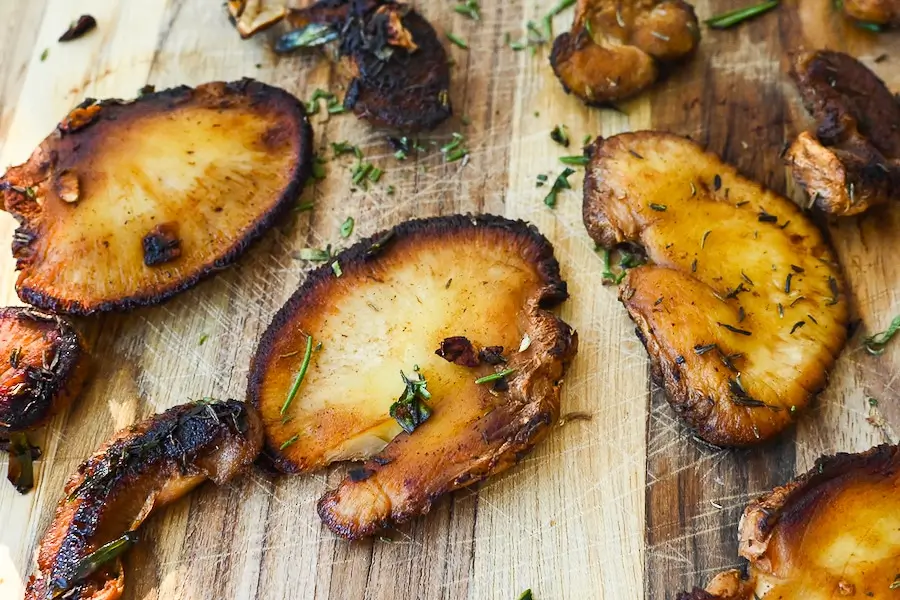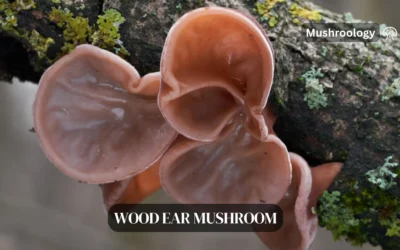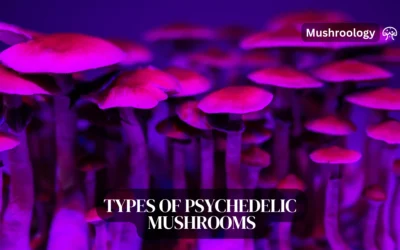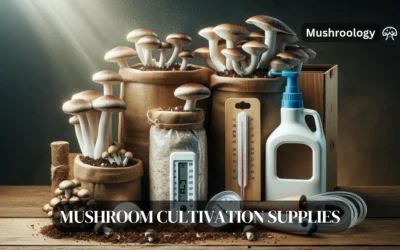Why Mushroom Meat Substitutes Are Taking Over the Plate
Are mushrooms a good meat substitute? Absolutely. If you’re looking to replace meat with mushrooms, you’ve found the right guide. I’ll show you exactly which mushrooms work best as meat substitutes, how to prepare them, and why they’re becoming the go-to alternative for everyone from vegans to flexitarians.
Why mushrooms as meat substitute work so well
Let me answer the big question first: Is mushroom meat? No, mushrooms aren’t meat – they’re fungi. But here’s why mushrooms make the best meat substitute:
- Texture: Mushrooms have a naturally meaty, fibrous structure that mimics muscle tissue
- Umami flavor: Rich in glutamates, giving that savory, meat-like taste
- Protein: While not as high as meat (3-4g vs 25g per 100g), they’re complete proteins with all essential amino acids
- Zero cholesterol: Unlike meat, mushrooms contain no cholesterol
- Minimal processing: Whole mushrooms need no additives to taste meaty
Best mushroom for meat substitute – ranked by use
1. Portobello mushrooms – best mushroom meat substitute for burgers
Why they’re #1: Large, flat caps perfect for grilling Texture: Dense and meaty when grilled Best for: Burger patties, steaks, grilled “meat” Protein: 3.1g per 100g Prep tip: Remove gills for less moisture, marinate 30 minutes before grilling
2. King oyster mushrooms – best for pulled “pork” and scallops
Texture: Shreds like pulled meat when cooked Best for: Pulled “pork,” vegan scallops, “chicken” strips Unique feature: Thick stems that can be scored and seared Protein: 3.3g per 100g
3. Shiitake mushrooms – best mushroom meat substitute for bacon
Why use shiitake: Intense umami, crispy when cooked Best for: Bacon strips, ground “meat,” stir-fries Preparation: Slice thin, cook until crispy for shiitake meat substitute Note: Remove tough stems before cooking
4. Lion’s mane mushrooms – best for seafood alternatives
Texture: Stringy, crab-like consistency Best for: Crab cakes, “lobster” rolls, fish alternatives Unique: Naturally tastes slightly like seafood Protein: 2.5g per 100g
5. Oyster mushrooms – versatile meat replacement mushroom
Why they work: Tender texture, mild flavor takes on seasonings Best for: Fried “chicken,” nuggets, general meat substitute Cost: Usually cheapest option Growing: Easiest to grow at home
Mushroom vs meat – nutritional comparison
| Nutrient (per 100g) | Mushrooms | Beef | Chicken | Pork |
|---|---|---|---|---|
| Calories | 22-35 | 250 | 165 | 242 |
| Protein | 2-4g | 26g | 31g | 27g |
| Fat | 0.3g | 15g | 3.6g | 14g |
| Cholesterol | 0mg | 90mg | 85mg | 80mg |
| Fiber | 1-2g | 0g | 0g | 0g |
| Iron | 0.5mg | 2.6mg | 0.9mg | 0.9mg |
Key point: While mushrooms have less protein, they’re much lower in calories and fat, making them ideal for weight management.
Mycelium-based meat – the future of fake meat from mushroom roots
What is mycelium-based meat?
Mycelium is the root-like structure of mushrooms. Companies are now growing mycelium into meat-like products:
- Texture: Can mimic whole muscle cuts like steak or chicken breast
- Protein: Up to 20g per 100g (much higher than whole mushrooms)
- Process: Grown in fermentation tanks in 5-10 days
- Brands: Meati, MyBacon, Atlast Food Co.
Why mycelium matters for mushroom based meat
- Minimal processing required
- Creates more realistic meat textures
- Higher protein content than whole mushrooms
- Can be shaped into any form
Can mushrooms replace meat completely?
The honest answer: Yes, but with planning. Here’s how to make mushrooms a complete meat replacement:
Protein considerations when replacing meat with mushrooms
Since mushrooms are lower in protein, combine them with:
- Legumes: Add 15-20g protein per cup
- Nuts/seeds: Add 5-7g protein per ounce
- Whole grains: Add 5-8g protein per cup
- Nutritional yeast: Adds B12 (missing in mushrooms)
Mushroom meat substitute recipes for complete nutrition
High-protein mushroom “meatballs”:
- 2 cups chopped mushrooms
- 1 cup cooked lentils
- 1/2 cup breadcrumbs
- 2 tbsp ground flax
- Seasonings Total protein: 18g per serving
How to prepare mushrooms as meat substitute
- Don’t wash – wipe with damp cloth to preserve texture
- Remove excess moisture – press between paper towels
- Marinate – 15-30 minutes in umami-rich marinades
- High heat – sear or grill for meat-like exterior
- Don’t overcrowd – cook in batches for proper browning
Best marinades for mushroom meat alternative
Basic umami marinade:
- 3 tbsp soy sauce
- 1 tbsp balsamic vinegar
- 2 cloves garlic, minced
- 1 tsp smoked paprika
- 1 tbsp olive oil
BBQ-style marinade:
- 1/4 cup BBQ sauce
- 2 tbsp apple cider vinegar
- 1 tbsp liquid smoke
- 1 tsp onion powder
Cooking methods for meat-like mushrooms
Grilling (best for portobellos):
- 400°F, 4-5 minutes per side
- Brush with oil to prevent sticking
Pan-searing (king oysters, shiitake):
- High heat, minimal oil
- Don’t move for 3-4 minutes for crispy exterior
Roasting (all varieties):
- 425°F for 20-25 minutes
- Flip halfway through
Slow-cooking (for pulled textures):
- Low heat, covered, with liquid
- 45-60 minutes until shreddable
Are mushrooms a good substitute for meat nutritionally?
What mushrooms provide:
- Complete protein (all essential amino acids)
- B vitamins (except B12)
- Vitamin D (when UV-exposed)
- Minerals: selenium, potassium, copper
- Fiber (absent in meat)
- Antioxidants: ergothioneine, glutathione
What’s missing compared to meat:
- B12: Supplement needed
- Iron: Lower amounts (pair with vitamin C foods)
- Zinc: Present but less bioavailable
- Protein quantity: Need larger portions or combinations
Environmental benefits of mushroom plant based meat
Mushrooms vs meat environmental impact:
Water usage:
- Mushrooms: 1.8 gallons per pound
- Beef: 1,800 gallons per pound
Carbon emissions:
- Mushrooms: 0.7 kg CO2 per pound
- Beef: 27 kg CO2 per pound
Land use:
- Mushrooms: Can grow vertically, minimal space
- Beef: 20x more land required
Frequently asked questions
What mushrooms are good meat substitute? Portobello for burgers, king oyster for pulled textures, shiitake for bacon, lion’s mane for seafood, oyster for fried “chicken.”
Is mushroom a meat? No, mushrooms are fungi, not meat. But they provide similar umami flavors and meaty textures.
Are mushrooms meat for vegetarians? Mushrooms are 100% vegetarian and vegan. They’re often called “vegetarian meat” due to their meaty qualities.
Best mushrooms to substitute for meat in specific dishes?
- Burgers: Portobello caps
- Tacos: Diced oyster or shiitake
- Stir-fry: Mixed Asian mushrooms
- Pasta: Sliced baby bellas
- BBQ: King oyster “pulled pork”
Can I replace all meat with mushrooms? Yes, but ensure adequate protein by combining with legumes, nuts, and grains. Supplement B12.
Do mushrooms taste like meat? They have natural umami (savory) flavor similar to meat. Proper seasoning and cooking enhances meat-like taste.
Start replacing meat with mushrooms today
Now you know exactly which mushrooms work as meat substitutes and how to prepare them. Start with one meal – try grilled portobello burgers or king oyster “scallops.” Once you experience how satisfying mushroom meat alternatives can be, you’ll understand why millions are making the switch.
Remember: mushrooms aren’t trying to be meat – they’re something better. Lower in calories, zero cholesterol, packed with nutrients, and incredibly sustainable. Whether you’re fully plant-based or just reducing meat intake, mushrooms as meat substitute offer the perfect solution.
Ready to try? Pick up some portobellos and start with the basic marinade recipe above. Your body (and the planet) will thank you!





